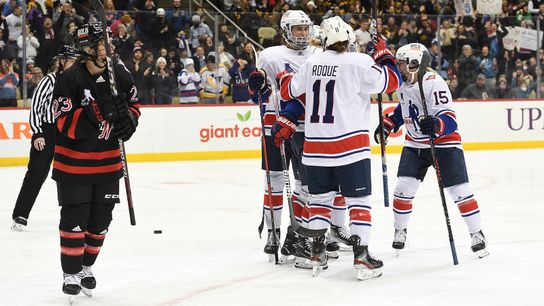MONTREAL -- The Penguins have played host to a number of successful professional women's hockey events in recent years.
First came the sold-out National Women's Hockey League All-Star Game in Cranberry in 2017. The NWHL twice returned to Cranberry for neutral-site, regular-season games — a Beauts-Whale game in 2017-18 and a Whale-Riveters game in 2018-19, both in front of sold-out crowds. The U.S. and Canadian women's national teams held a joint training camp in Cranberry in 2019, culminating in two sold-out exhibition games.
The Professional Women's Hockey Players Association came to Pittsburgh this past March, with the women from the U.S. and Canadian national teams holding a "Rivalry Rematch" game at PPG Paints Arena, a sequel to the Olympic gold-medal game in Beijing in which Canada came away with a 3-2 victory.
The Canadian women won the rematch in Pittsburgh, but the result wasn't what was most important about that night. Players from both teams raved afterward about the turnout from the fans and how well the Penguins ran the event. It was a testament to there being a strong market for women's hockey when it gets even a fraction of the marketing and other resources that the men's game gets on a regular basis.
"Today was pretty special," said Canadian captain Marie-Philip Poulin. "Walking in, treated like professionals, I think that's something that we've been wanting for years. After the momentum from the Olympics, having this game within two weeks of notice and having that many people in the stands, this is just the start of something great. We believe in what we have."
"To have the Pittsburgh Penguins pull this off in two and a half -- less than that -- weeks and to have the crowd that we had tonight is incredible," U.S. forward Hilary Knight said. "You know, we've always had NHL club support. But it's extremely special to have the Rivalry Rematch and the fashion and the professionalism in which the Pittsburgh Penguins did it. Partnering with the PWHPA it's such a unique opportunity, that I hope this continues as its own asset moving forward."
The Penguins and Fenway Sports Group ownership has seen that women's hockey can succeed in the Pittsburgh market. And they want a team of their own, now.
Penguins president of business operations Kevin Acklin told me this week that the Penguins have "ongoing" conversations internally and with the NHL about bringing a potential Penguins-backed professional women's team to Pittsburgh.
One professional women's league currently exists: The Premier Hockey Federation, formerly known as the NWHL. The PHF currently has six teams: The Boston Pride, Buffalo Beauts, Connecticut Whale, Metropolitan Riveters, Minnesota Whitecaps, and Toronto Six.
The PWHPA is reportedly looking to form its own professional league with six teams in both the U.S. in Canada within the next year. The women of the PWHPA would likely be looking for at least a partially NHL-backed league, with teams playing in NHL cities and partnering with the NHL club, in order to share resources like marketing and facilities.
The Penguins are among 10 teams who currently have a partnership with the PWHPA, the others being the Flyers, Capitals, Flames, Coyotes, Blackhawks, Blues, Rangers, Maple Leafs and Senators.
"We've offered to be at the table in discussions and negotiations around a potential future league, whether that's an ancillary league that's tied to the NHL or an independent league," Acklin told me. "We want to be part of that conversation and help make it happen."
The reception the U.S. and Canadian PWHPA women received in the Rivalry Rematch game in March is one of the reasons the Penguins are so passionate about seeking a women's team of their own. Not only was the game popular with the fans, but the Penguins players themselves were in support of the women's game.
"That game was awesome," Acklin said. "You know, that came together so quickly. But the best thing about it was while the women were on the ice playing, all the Penguins, the full team was there watching. We had them in a party suite, they were all there. It was the first time I've seen them all at a hockey game together. And so that was meant to show solidarity."
The market for women's hockey is there when it's marketed properly. We see it every four years. The 2018 gold-medal game drew 3.7 million viewers on NBCSN alone, making it the most watched late-night program in NBCSN history. The 2022 gold-medal game drew 3.54 million viewers on NBC, making it the second most-watched hockey game of any kind in the U.S. since 2019, behind only Game 5 of the 2021 Stanley Cup Final in which Tampa Bay beat Montreal to clinch the Stanley Cup.
Acklin described it as the men's game having a "head start." Men's hockey went through its own growing pains in early years. A number of different leagues sprung up in the early 20th century in competition with each other. Those leagues and teams weren't immediately successful and profitable, they needed the support of investors before they could stand on their own. The NHL has had over 100 years to develop into what it is now.
The Penguins and other investors in women's hockey are looking to help close the near century-long head start the professional men's game has had.
"There's no reason why women's sports, especially in hockey, shouldn't have all the privileges that a male sport does," Acklin said. "Men's hockey has had a head start on building the fan base and the economics and the structure that's led into the NHL. And I feel very strongly, as does our ownership, that we need to be supportive and use that privilege to advance the game for women's hockey. So we are constantly a supporter."

